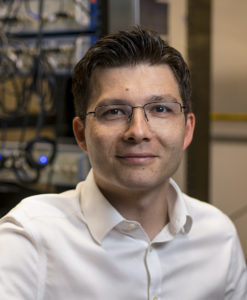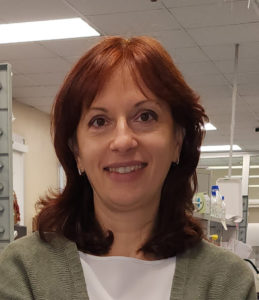In 2024, the winners of the Chica and Heinz Schaller Foundation Award in Translational Neuroscience are Prof Sergiu Pasca (US) and Prof Maria Pennuto (IT).
 Meet Prof Sergiu Pasca
Meet Prof Sergiu Pasca
Professor Sergiu Pasca of Stanford University has led the way in developing self-organising, stem-based organoid and assembloid models of the human nervous system and systematically applied them to uncover the mechanisms of severe neuropsychiatric disorders with the goal of developing new therapeutics.
Professor Pasca developed bottom-up approaches to leverage self-organization in biological systems and assemble, from multi-cellular components, human neural circuits in vitro and, following engraftment, in vivo into animals. These revolutionary approaches are changing our understanding of neuropsychiatric disorders impacting infants and children and are already enabling the development of therapeutics for these conditions.
At Stanford, he carved a unique research program that combines rigorous in vivo and in vitro neuroscience, stem cell biology, and pharmacology to construct and deconstruct previously inaccessible stages of human neural function in health and disease.
He pioneered a creative approach to create functional neural circuit in preparations he named assembloids and his lab introduced the use of instructive signals to generate self-organising regionalised neural organoids. This enabled surprising discoveries, including about developmental timing and self-assembly of early circuits in the nervous system. More importantly, Sergiu leveraged his medical background to apply these models and acquire a deeper understanding of mechanisms of genetic disorders. He discovered electrophysiological defects in 22q11.2 deletion syndrome cortical neurons and the underlying mechanism. He discovered that an abnormal protein folding response causes a premature depletion of intermediate progenitors during hypoxia in cortical development and found ways to prevent it. He discovered the molecular and cellular basis of Timothy syndrome using organoids, assembloids and transplantation studies. The deeper understanding of the biology of this condition, enabled Professor Pasca to develop the first potential therapeutic intervention for Timothy syndrome using a clever exon utilisation switch and he is now preparing a clinical trial.
Moreover, Professor Pasca extensively supported hundreds of labs around the world in implementing these techniques through courses and has been actively involved in bringing together groups around the world to reach consensus and develop an experimental framework for human multi-cellular models.
Professor Pasca’s work has been extensively recognized. He was named a Visionary in Medicine and Science by the New York Times. He is a Knight of the Order of Merit and a Doctor Honoris Causa. He was featured as a physician-scientist by Nature Medicine, was a NYSCF Robertson Investigator and a TED 2022 Speaker. He received the Vilcek Prize, the Altman Award for Developmental Neuroscience, the Daland Award from the American Philosophical Society, the IBRO-Kemali Award, and other prestigious recognitions.
Overall Professor Pasca’s contributions to developing human cellular models of neuropsychiatric disorders, the clinical implications of the tools and discoveries he has developed have the potential to accelerate the study of nervous system disorders and thereby improve their treatments.
 Meet Prof Maria Pennuto
Meet Prof Maria Pennuto
Maria Pennuto’s groundbreaking research in translational neuroscience has made substantial contributions to our understanding of neurodegenerative diseases and has the potential to significantly impact the development of therapeutic strategies. Her work encompasses several key areas of focus that have implications for both basic science and clinical applications. Her achievements include:
Identification of Crucial Post-Translational Modifications (PTMs): Maria Pennuto’s research has shed light on the intricate role of PTMs in neurodegenerative diseases. By identifying specific PTMs that influence the toxic behaviour of disease-linked proteins, she has unveiled potential therapeutic targets for conditions such as ALS, SBMA, and HD. This knowledge is pivotal in developing strategies to modulate disease protein behaviour and mitigate their harmful effects.
Understanding Enzymatic Modifiers and Signaling Pathways: Her work in deciphering the enzymatic modifiers responsible for regulating PTMs in disease-linked proteins has provided insights into the underlying molecular mechanisms. Additionally, her exploration of signaling pathways that modulate enzyme activity has opened up critical nodes for potential therapeutic intervention. These discoveries offer a foundation for the development of targeted drugs to modify PTMs and modulate disease protein function.
Validation through Preclinical Studies: The use of mouse models of various neurodegenerative diseases to validate the efficacy of therapeutic strategies demonstrates the translational potential of her work. By showing how ligands and first messengers can impact disease proteins and alleviate disease phenotypes, she has established a strong rationale for potential clinical applications.
Drug Repurposing for Clinical Relevance: Maria Pennuto’s emphasis on drug repurposing accelerates the translation of research findings into clinical practice. By repurposing existing drugs with proven safety profiles, she has demonstrated their potential efficacy in treating neurodegenerative diseases, offering a quicker path to accessible treatments for patients.
Patient-Derived Cell Studies: Her use of patient-derived cells and tissues for evaluating therapeutic interventions provides a personalised and clinically relevant approach. This bridge between bench research and clinical applications ensures that treatments are tailored and effective, potentially leading to improved patient outcomes.
Translational Impact: Maria Pennuto’s research has far-reaching implications, evident in the development of phase II clinical trials for SBMA and the pending development of a novel strategy (AAV-miRNA). Her work showcases a commitment to bringing scientific discoveries closer to tangible clinical benefits, inspiring fellow researchers, patients, and clinicians.
Maria Pennuto’s contributions to translational neuroscience have significantly advanced our understanding of age-related neurological disorders and provided a strong foundation for the development of innovative therapeutic strategies. Her accomplishments not only contribute to the scientific community’s knowledge but also hold the potential to positively impact the lives of individuals affected by neurodegenerative diseases. Her dedication to bridging the gap between research and clinical application is a testament to her exceptional work and its enduring impact.